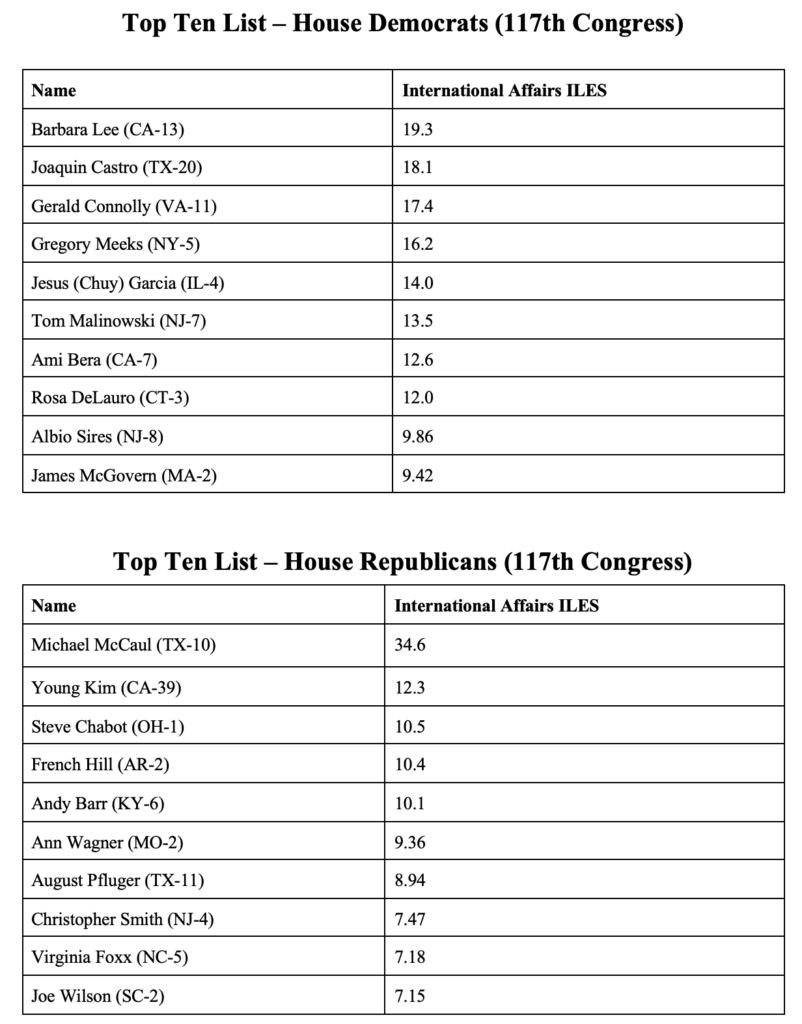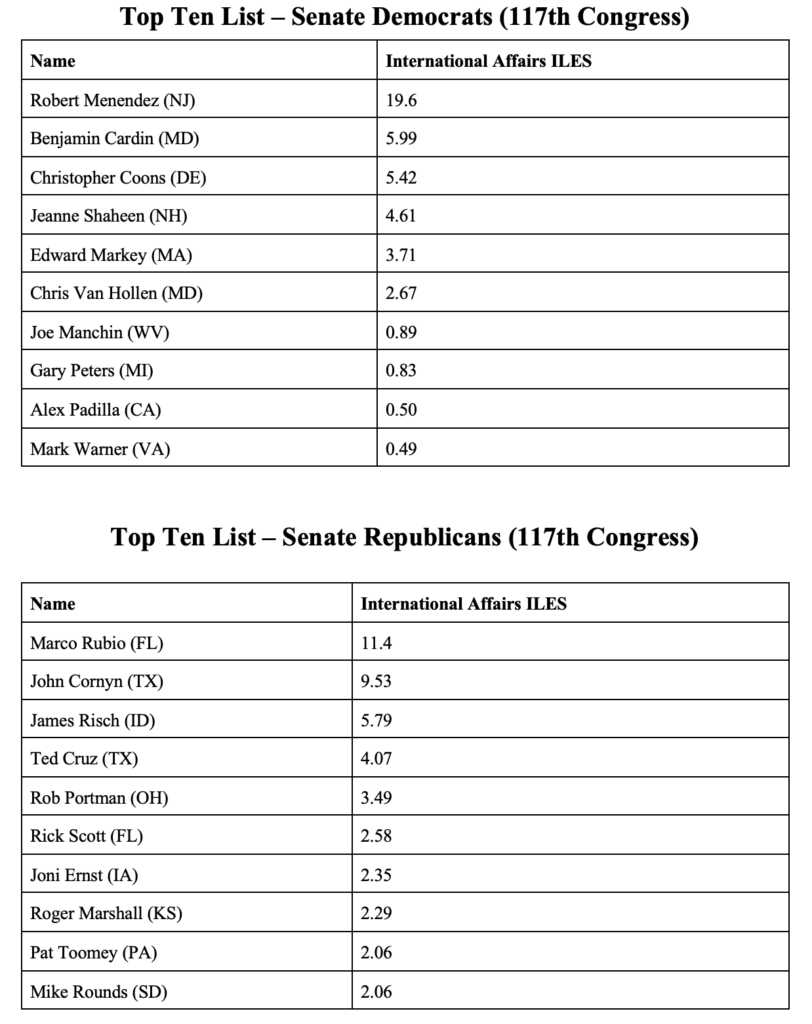Continuity During Chaos: Observations on International Affairs Legislative Effectiveness Scores during the 117th Congress
With the onset of the war in Ukraine in early 2022 and continued tensions between China and Taiwan, the 117th Congress faced significant foreign policy challenges. Relying on our new approach of tracking embedded legislation (legislation that was absorbed into larger proposals), the Center for Effective Lawmaking found significant congressional action to address Russia-Ukraine and China-Taiwan issues, despite high levels of policy gridlock in this issue area more generally. We identify the most effective lawmakers in this important policy area across both parties and both chambers. Our scores and the fates of successful proposals demonstrate that, despite partisan political headlines in recent years, bipartisanship continued in the international relations sphere of lawmaking.
During the 117th Congress (2021-2023), the United States was faced not only with existing international issues, including the COVID-19 pandemic and embattled relations with China, but also with a full-scale war instigated by one of its foremost adversaries. The war in Ukraine created an extraordinarily complicated and critical moment for American foreign policy. At the Center for Effective Lawmaking (CEL), we believe that effective work by lawmakers during such trying times should be highlighted.
We released our Legislative Effectiveness Scores (LES) in March, identifying the most effective lawmakers on both sides of the aisle in the 117th Congress. Beyond the holistic LES, the Center also creates independent Interest and Legislative Effectiveness Scores (ILES) that capture how successful legislators were in advancing their agendas in twenty-one different policy areas, one of which is International Affairs. These scores extend back to the 93rd Congress (1973-1975) and provide countless insights as to which policymakers (and which political strategies) are most effective in addressing major issues of the time. Details of our methodology and lists of top International Affairs lawmakers are given below for the 117th Congress.
As in the previous Congress, passing international affairs legislation was not an easy task. Out of 350 and 564 bills introduced in the Senate and House, respectively, only 6 and 8 became law (success rates of 1.7% and 1.4%, respectively). If embedded bills (standalone bills that were ultimately attached to other legislation) are accounted for, the success rates rise to 6.0% and 4.1%. These rates remain slightly below the rates of the 116th Congress, despite unified Democratic government.
Given how selective passage of international affairs legislation was, it is especially worthwhile to explore what made it through the political gauntlet. Unsurprisingly, legislation pertaining to Ukraine and China dominated the list bills that ultimately became law. Of the fourteen passed International Affairs bills (according to the Congressional Research Service), four pertained to Russia and Ukraine, while two more pertained directly to China and Taiwan. A consideration of the successfully embedded legislation reveals a similar pattern, with bills such as the Indo-Pacific Engagement Act (sponsored by Rep. Ami Bera, D-CA), the Ukraine Comprehensive Debt Payment Relief Act of 2022 (sponsored by Rep. Jesus Garcia, D-IL), and the Taiwan Fellowship Act (sponsored by Sen. Edward Markey, D-MA), rolled into the National Defense Authorization Acts of 2022 and 2023. In total, ten more pieces of Ukraine- and China-related legislation were embedded in bills that became law. That a plurality of legislation focused on these two primary issues is notable but unsurprising given how dominated international discourse has been by matters pertaining to Ukraine and Taiwan.
Due to the multifaceted nature of many of these issues, a high degree of bipartisanship in International Affairs legislation largely continued, with the only possibly notable exception being the authorization of additional funding for Ukraine, which 57 Republicans opposed. Republican legislators continued to have success in advancing their agendas, especially Rep. Michael McCaul (R-TX), now the Chair of the House Foreign Affairs Committee during the 118th Congress (and Ranking Member during the 117th Congress). His International Affairs ILES of 34.6 was the highest score of all Representatives by a wide margin, dwarfing the highest scores from Democratic House members and Senators on both sides of the aisle.
Intriguingly, one’s lawmaking effectiveness in International Affairs was very highly correlated to one’s overall lawmaking effectiveness among members of the Republican Party. Of the top ten House Republicans (listed below), nine were among the top 40 most effective Republican lawmakers (overall). No such correlation was present for Democrats. In the Senate, eight of the ten most effective lawmakers in International Affairs were among the top half of the most effective Republican senators overall.
A few members of Congress deserve special recognition for their truly notable lawmaking successes during the 117th Congress. Sen. Robert Menendez (D-NJ), Chairman of the Senate Foreign Relations Committee, not only passed two pieces of standalone legislation but embedded two more, such that four of his sponsored bills ultimately became law. Those bills included the RENACER Act, which establishes measures to address corruption and human rights abuses in Nicaragua, S.812, which creates a plan to regain observer status for Taiwan in the World Health Organization, the Trans-Sahara Counterterrorism Act, and the Department of State Authorization Act of 2022. His work spanned multiple crucial foreign policy priorities, demonstrating his notable ability to work as an effective chair in gathering support on a variety of issues.
Rep. Young Kim (R-CA) also stands out as an especially highly effective lawmaker on this list, as she is the only freshman member of Congress to be among the Top Ten most effective Republican lawmakers in international affairs. Moreover, in her freshman term she was actually the second-ranked Republican House member on this list, falling only behind Rep. Michael McCaul. In being elected to the 117th Congress, she became one of only three Republican candidates to unseat an incumbent House Democrat in California since 1994. She managed to win in a district that has voted consistently Democratic in presidential elections since 2008, and she is rated as one of the most centrist of all Republican representatives. She is currently the chair of the subcommittee on the Indo-Pacific in the 118th Congress, where she has proposed legislation pertaining to the Uyghurs, Taiwan, and North Korea. As a freshman member of Congress in the 117th Congress, she had an immediate impact on the lawmaking process; and those interested in future foreign policy actions would benefit from watching or working with her closely.


Methodology
The LES and ILES scores are compiled through the combination of fifteen metrics corresponding to the public bills that each member of Congress sponsors, how far these bills move in the lawmaking process, and how significant their bills are to the issue selected. The set of bills considered among each issue area is based on the key policy topics covered in the bill, as classified by the Congressional Bills Project and the Congressional Research Service. Scores in each issue area are constructed to a mean value of 1.0 in the House and Senate for each Congress. More on our methodology can be found here. Each legislator’s LES and ILES across numerous policy areas can be found here.
For the evaluation of the 117th Congress, the Center implemented a new innovation to the methodology: the incorporation of embedded legislation into a legislator’s score. By comparing the wording of proposed bills and enacted laws, we were able to give legislators credit for legislation that was absorbed into larger proposals, which ultimately became law. By accounting for the fate of embedded legislation, we can extend credit to legislators whose sponsored bills (and/or large portions of their sponsored bills) ultimately became law, even if their sponsored bill didn’t become law as a standalone measure. Of 40 legislators identified in this article, eighteen of them sponsored bills that were ultimately embedded into other bills that became law on matters pertaining to international affairs, despite not sponsoring one of the fourteen standalone bills that became law. Especially among the minority party, giving credit for embedded legislation helps us to identify highly effective lawmakers in a manner that would not be possible without the incorporation of our research innovation.
Authors
This report was researched and written by Wyatt Dayhoff and Craig Volden. Wyatt is a rising second year at the University of Virginia intending to major in Leadership and Public Policy at the Batten School. He is the Secretary of the Class of 2026 and a member of the Jefferson Literary and Debating Society. This summer, Wyatt is serving as a District Ambassador for his hometown representative, Dean Phillips (MN-3).



